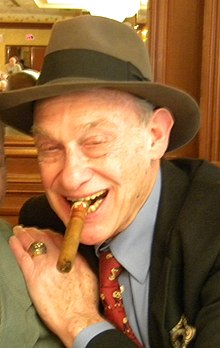Bert Sugar
Bert Sugar | |
|---|---|
 Sugar in 2010 | |
| Born | Herbert Randolph Sugar June 7, 1936 Washington, D.C., U.S. |
| Died | March 25, 2012 (aged 75) Mount Kisco, New York, U.S. |
| Alma mater | University of Maryland University of Michigan |
| Occupation(s) | Boxing writer, sports historian |
| Years active | 1968–2012 |
| Spouse | Suzanne Sugar |
| Children | 2 |
| Awards | International Boxing Hall of Fame, Ellis Island Medal of Honor |

Herbert Randolph Sugar (June 7, 1936 – March 25, 2012)[1] was an American boxing writer and sports historian known for his trademark fedora and unlit cigar.[2][3]
Early life and education[edit]
Sugar was born in Washington, D.C., on June 7, 1936.[1] In 1953, he graduated from Woodrow Wilson High School in Washington, where he was a reporter and columnist for the school's newspaper. His entry in the high school yearbook for that year predicted he "will become a radio announcer or sports writer". Sugar graduated from the University of Maryland before earning a JD and MBA from the University of Michigan[1] in 1960.
Career[edit]
After passing the bar, Sugar worked in advertising, including with the McCann Erickson agency. He was Publisher-Editor of Baseball Monthly magazine in 1962. Sugar bought Boxing Illustrated magazine in 1969 and was editor until 1973.[4] From 1979 to 1983 he was editor and publisher of The Ring magazine. In 1988 he again became editor of Boxing Illustrated. In 1998 he founded Bert Sugar's Fight Game.
Sugar wrote more than 80 books, focusing on his favorite sports of boxing and baseball. Among his boxing books are Great Fights, Bert Sugar on Boxing, 100 Years of Boxing, Sting like a Bee (with José Torres), The Ageless Warrior (Preface, with Mike Fitzgerald) and Boxing's Greatest Fighters. Sugar was ranked as "The Greatest Boxing Writer of the 20th Century" by the International Veterans Boxing Association.[5]
In May 2009 Sugar published Bert Sugar's Baseball Hall of Fame: A Living History of America's Greatest Game through Running Press.[6]
With James Randi, Sugar co-wrote a book about Harry Houdini titled Houdini, His Life and Art.
Along with Lou Albano, he helped write The Complete Idiot's Guide to Pro Wrestling.[7] He wrote a regular sports column for Smoke Magazine, a quarterly cigar lifestyle magazine. Sugar was described by sportscaster Bob Costas as being "Runyonesque" (in reference to Damon Runyon).[citation needed]
Representation in other media[edit]
Sugar appeared in several films playing himself, including Night and the City (1992), The Great White Hype, and Rocky Balboa. Interviews with Sugar feature in the documentary Unforgivable Blackness: The Rise and Fall of Jack Johnson.
Death[edit]
Sugar died from lung cancer on March 25, 2012, at age 75, with his family bedside at Northern Westchester Hospital in Mount Kisco, New York.[3]
References[edit]
- ^ a b c Weber, Bruce (March 27, 2012). "Bert Sugar, Boxing Writer and Commentator, Is Dead at 75". The New York Times. Retrieved July 14, 2022.
- ^ Mathews, Wallace (March 26, 2012). "We'll never see another Bert Sugar: Iconic writer always had a cigar in mouth, a fedora on head and a joke on his lips". ESPN.
- ^ a b "Iconic Boxing Writer And Historian Bert Sugar Has Died". Newyork.cbslocal.com. March 25, 2012. Retrieved March 25, 2012.
- ^ Magno, Paul (March 26, 2012). "Boxing writer Bert Sugar, 75, dies". The Boxing Tribune. msn.foxsports.com. Retrieved March 27, 2012.
- ^ "HBO boxing commentator profile". Archived from the original on January 24, 2010. Retrieved November 11, 2011.
- ^ Nemec, David (May 5, 2009). Bert Sugar's Baseball Hall of Fame: A Living History of America's Greatest Game (9780762430246): Bert Randolph Sugar, Bruce Curtis: Books. Running Press. ISBN 978-0762430246.
- ^ Albano, Lou; Sugar, Bert (1999). The Complete Idiot's Guide to Pro Wrestling. Alpha Books. ISBN 0028623959.
External links[edit]
- 1936 births
- 2012 deaths
- American people of Hungarian-Jewish descent
- Jewish American sportswriters
- Sportswriters from Washington, D.C.
- University of Maryland, College Park alumni
- University of Michigan Law School alumni
- International Boxing Hall of Fame inductees
- Ross School of Business alumni
- American male non-fiction writers
- 21st-century American Jews
- The Ring (magazine) people
- Boxing writers
- Deaths from lung cancer in New York (state)
